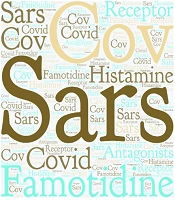Dear Editor,
Since December 2019, Coronavirus disease 2019 (COVID-19) has spread around the world, and numerous cases have been reported worldwide. To date, research and medical studies have not proposed any guidelines for steady treatment of COVID-19 patients (1). Consequently, medications for previous strains of coronavirus (SARS-CoV and MERS-CoV) are currently used as the core treatment practiced against SARS-CoV-2, the virus causing COVID-19 (1, 2).
Famotidine, a histamine-2 receptor antagonist, suppresses gastric acid production and is commonly prescribed orally or parenterally as a prophylaxis for stress ulcers and hemorrhages in hospitalized patients (3). In vitro, histamine type 2 receptor antagonists (cimetidine, ranitidine, and famotidine) have revealed antiviral properties by inhibiting HIV replication (4). For instance, in Wang et al.’s study on HIV-infected patients, coadministration of Famotidine and Atazanavir/Ritonavir reduced the exposure to Atazanavir (5).
In a recent study, Wu et al. identified all proteins encoded by SARS-CoV-2 genes and predicted their structures. They reported 3-chymotrypsin-like protease (3CLpro), Spike, RNA-dependent RNA polymerase (RdRp), and papain-like protease (PLpro) to be among the most important targets. Additionally, they aimed to predict potential medicines acting on a specific target (two human-relative targets and 19 constructed targets of SARS-CoV-2) (6). The coronavirus replication complex is controlled by the main viral proteinase known as 3CLpro (Nsp5) (6, 7). Famotidine is one of the medicines with a high binding affinity to 3CLpro that can inhibit virus replication (6). In Freedberg et al.’s study, Famotidine was correlated with a two-fold decrease in clinical deterioration, leading to intubation or death in patients hospitalized with COVID-19 who were not initially in an intensive care setting. Furthermore, it was associated with a reduction in cytokine release in the setting of SARS-CoV-2 infection (3).
A particular G-protein-coupled receptor family known as type 2 taste receptors (TAS2Rs, mainly TAS2R 10) has been shown to play an essential role in host defense pathways (control of infectious diseases caused by bacteria, viruses, and parasites). Hence, agonists of these receptors may help fight COVID-19. TAS2Rs are widely expressed in the tongue, central nervous system, respiratory tract, breast, heart, gastric and intestinal mucosa, bladder, pancreas, and testis (8, 9). The stimulation capacity of Famotidine on TAS2R 10 contributes to the defense against infectious diseases. Moreover, in their study, Li et al. found that TAS2Rs and their agonists, in addition to having efficacy in stimulating host defenses, could prevent overactive immune responses (8).
According to Science Magazine, in a study of 6212 hospitalized patients with COVID-19 receiving Famotidine, the death rate decreased significantly to around 14%, compared to 27% for those not receiving the drug. However, the analysis was crude, and the results were not statistically significant (10).
Ongoing clinical trials and studies regarding efficacy of famotidine in treatment of COVID-19 patients are as follow: (1) a randomized controlled trial is currently ongoing to determine the efficacy of Famotidine in improving clinical outcomes in hospitalized patients with COVID-19 (NCT04370262); (2) according to an article in Science Magazine, a retrospective study on the efficiency of Famotidine in records from 1620 hospitalized patients with COVID-19 is under review in the Annals of Internal Medicine (10).
Several medicines, including Famotidine, are currently under research and evaluation for the treatment of COVID-19. According to the results from pharmacokinetic studies, the efficacy of Famotidine has been proven in the treatment of viruses. However, further research is recommended to generalize its effect on COVID-19.
